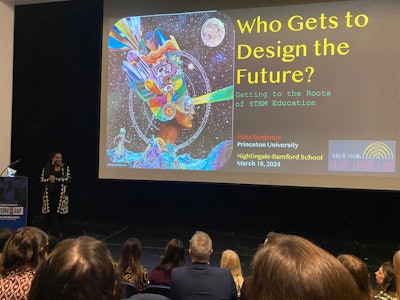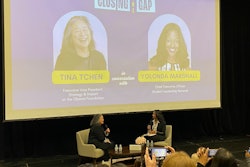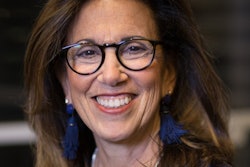NEW YORK
At The Nightingale-Bamford School on the Upper East Side of Manhattan, educators from across the nation gathered to learn the best practices to elevate young girls, particularly those from minoritized backgrounds, into successful futures.
“While American women have advanced in the last 175 years, we haven’t come close to achieving equity,” said Laura Rebell-Gross, senior managing director of Girls’ Education with the Student Leadership Network, a nonprofit organization working for educational equity. “Disparities exist across every discipline and women’s achievements still go unrecognized.”
The conference, Closing the Gap: The Role of Girls’ Education in Creating a More Equitable World, focused on the unique burdens confronting young women of today, and the biases in technology and AI that are impacting the present and future.
Despite girls and women often outperforming boys and men at both secondary and postsecondary institutions, Rebell-Gross said statistics regarding women’s representation in the workforce and beyond are staggering.
“Women make up just 15% of textbooks, 8% of public statues, less than one third of Congress, and the wage gap has barely budged. The disparities are much starker for women of color,” said Rebell-Gross.
Women make up half the workforce, she continued, yet they hold only 26% of executive positions—women of color hold only 5%. A 2019 study from Northwestern University’s Kellogg School of Management found 60% of U.S. companies do not have any female board members.
The conference, and the conversations it begins, are “how we close the gap—one school, one program, one teacher, and one student at a time,” said Rebell-Gross.
 Dr. Ruha Benjamin, author, sociologist, and professor in the department of African American Studies at Princeton University, presenting on technology and equity.
Dr. Ruha Benjamin, author, sociologist, and professor in the department of African American Studies at Princeton University, presenting on technology and equity.
“Any conversation about technology has to start with the society that gives rise to tech, the pre-existing forms of stratification that get encoded in digital systems,” said Benjamin.
Benjamin encouraged listeners to think carefully about the labor behind apps used every day, whether its Amazon or a food delivery service. What dignity do those workers receive, she asked, and who benefits from their efforts? While some technological bias is patently obvious, other bias can impact users without them even knowing. This has become what Benjamin calls, “the New Jim Code.”
“We assume that technology is in the driver’s seat, propelled by a will of its own. But the humans behind the screen are missing from that script,” said Benjamin. “Values, ideas, ideologies, assumptions, and desires, are encoded into our digital structure. As it stands, a small sliver of humanity is encoding their vision into the world we have to inhabit. We’re living inside someone else’s imagination.”
Benjamin said she wants students and educators to question and critique technology and to be creative when thinking of solutions. Technology can be adjusted. When given data based on the lived experiences of the users instead of the coders, AI and other tech produce less biased results, Benjamin said.
“If inequity is woven into the very fabric of our society, then each twist, coil, and code is a chance for us to weave new patterns, practices, and politics,” said Benjamin. “Its vastness will be its undoing, once we accept that we are the pattern makers.”
 Dr. Lisa Hinkelman shares research from her nonprofit, ROX.
Dr. Lisa Hinkelman shares research from her nonprofit, ROX.
“Social media is impacting everything—how they feel about their bodies, their relationships, and what they think is possible for them,” said Hinkelman.
If a girl’s lack of confidence is not addressed while she is young, said Hinkelman, then “girls’ challenges become women’s challenges,” said Hinkelman. “It’s important that higher education sees how the pipeline is, where it’s starting, and what challenges they need to be aware of when it comes to what girls are still experiencing as freshman and matriculating through college.”
Liann Herder can be reached at [email protected].






















